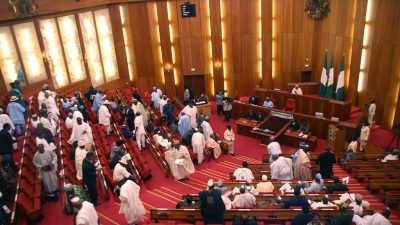CSOs attack Senate, call for passage of 2018 budget
Some Civil Society Organisations (CSOs), including Civil Society Legislative Advocacy Centre (CISLAC) on Wednesday, called on the National Assembly to pass the 2018 budget without further delay.
The Chairman, Partners for Electoral Reform (PER), Ezenwa Nwagwu, and Executive Director of CISLAC, Auwal Rafsanjani, made the call at a news conference on Wednesday in Abuja.
Mr Nwagwu said “it is sad that five months down the year, the national budget is not yet passed by the National Assembly. This is a statutory function of the National Assembly.
“Nigeria cannot grow its economy and provide for citizens’ welfare without a national budget passed, assented and fully implemented,” he said.
He said that the delay in the passage of the budget or the use of the budget for political gains was unpatriotic and was sabotaging the country’s growth and development.
Mr Nwagwu also condemned the delay in the passage of some key anti-corruption bills, saying it was worrisome.
“Bills such as Proceeds of Crime Bill, Whistle Blowers Protection Bill and other pending Bills in the extractive sector, which will further enhance the fight against corruption, need to be urgently passed by the National Assembly.”
Mr Nwagwu called on the Senate to re-focus and carry out its legislative and constitutional responsibility with a sense of patriotism towards supporting efforts in fighting corruption.
He said “we are disappointed at the apparent disproportionate refusal by the Nigerian Senate to confirm the substantive chief executives and boards of critical anti-corruption agencies (EFFC, ICPC and CCB).
“We frown at the seeming arbitrary use of the power of confirmation constitutionally granted the Senate to withhold the confirmation of the statutory governance structure of these bodies.”
Mr Nwagwu said that the delays were undermining the institutions’ capacity to effectively carry out their mandates.
He said that the CSOs were bothered that personnel of the armed forces, the police and intelligence agencies wallowed in poor salaries and without insurance.
“This is in spite of the enormous work they do and risk their lives on a daily basis. This creates low morale for personnel to fully engage in their duties,” he said.
Mr Nwagwu, however, said CSOs were not unaware of the faulty recruitment and selection processes in the nation’s security forces.
He said that this had led to situations where influential individuals determined who was recruited, thereby throwing competence and qualification to the dust.
He accused leadership of security agencies of monetising recruitment process, saying that it had left the country with “cash-and-carry’’ security apparatus”.
Mr Nwagwu said with such irregular recruitment process, no amount of upgrading of security system would check kidnappings, massacres and destruction of property across the country by insurgents and armed bandits if wrong persons were in charge.
“Upgrading arms and ammunition will not help to check the security challenges without getting citizens who are qualified, properly trained and have passion for the job get into the security institutions,” he said.
He said that in spite of low security presence to effectively secure citizens’ lives and property at national and state levels, a large number of security personnel and equipment were endlessly attached to politicians and net-worth individuals.
“The inadequacy of personnel and limited equipment has continued to pave way for the recurring politically and other socially-motivated conflicts.” (NAN)


